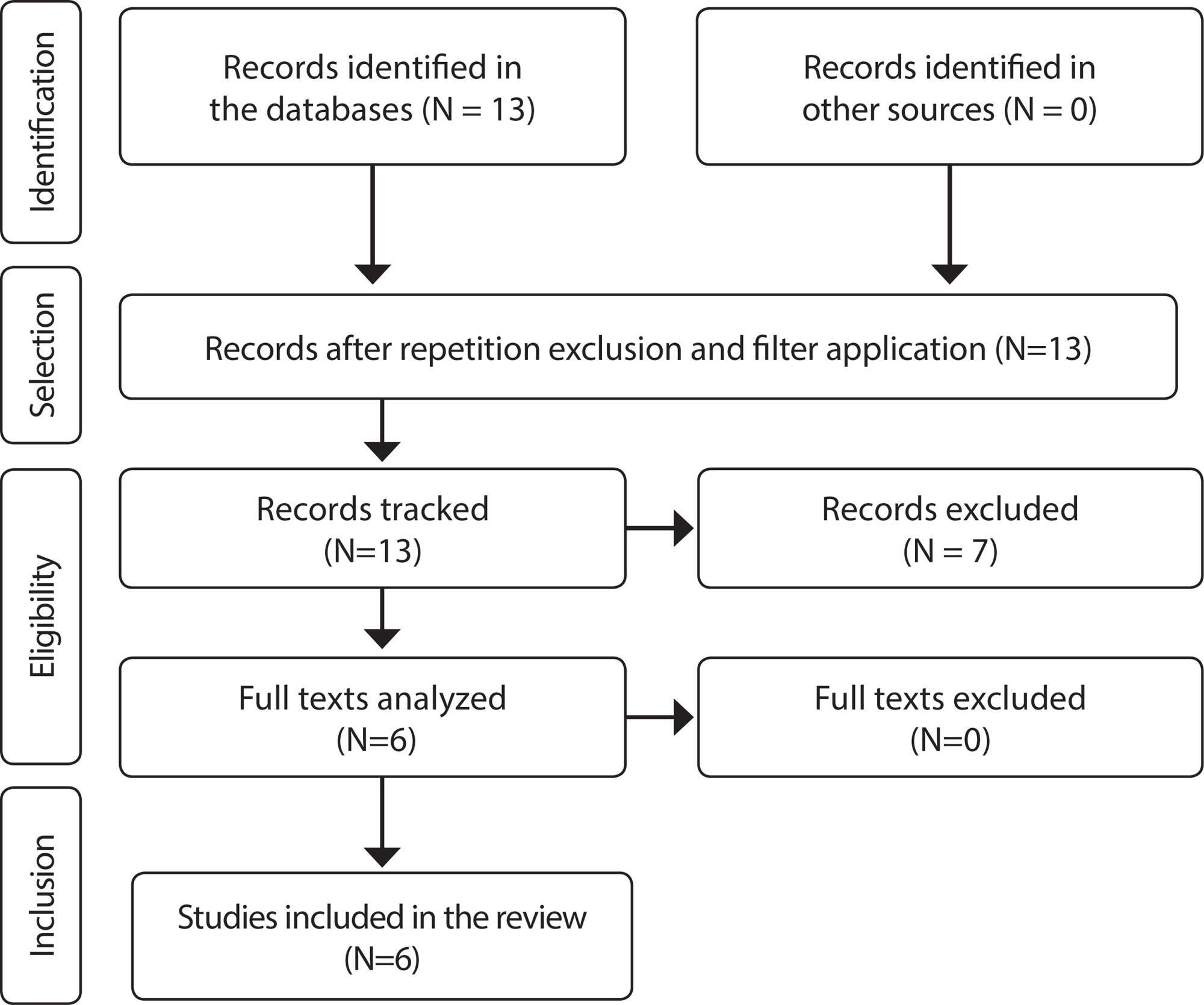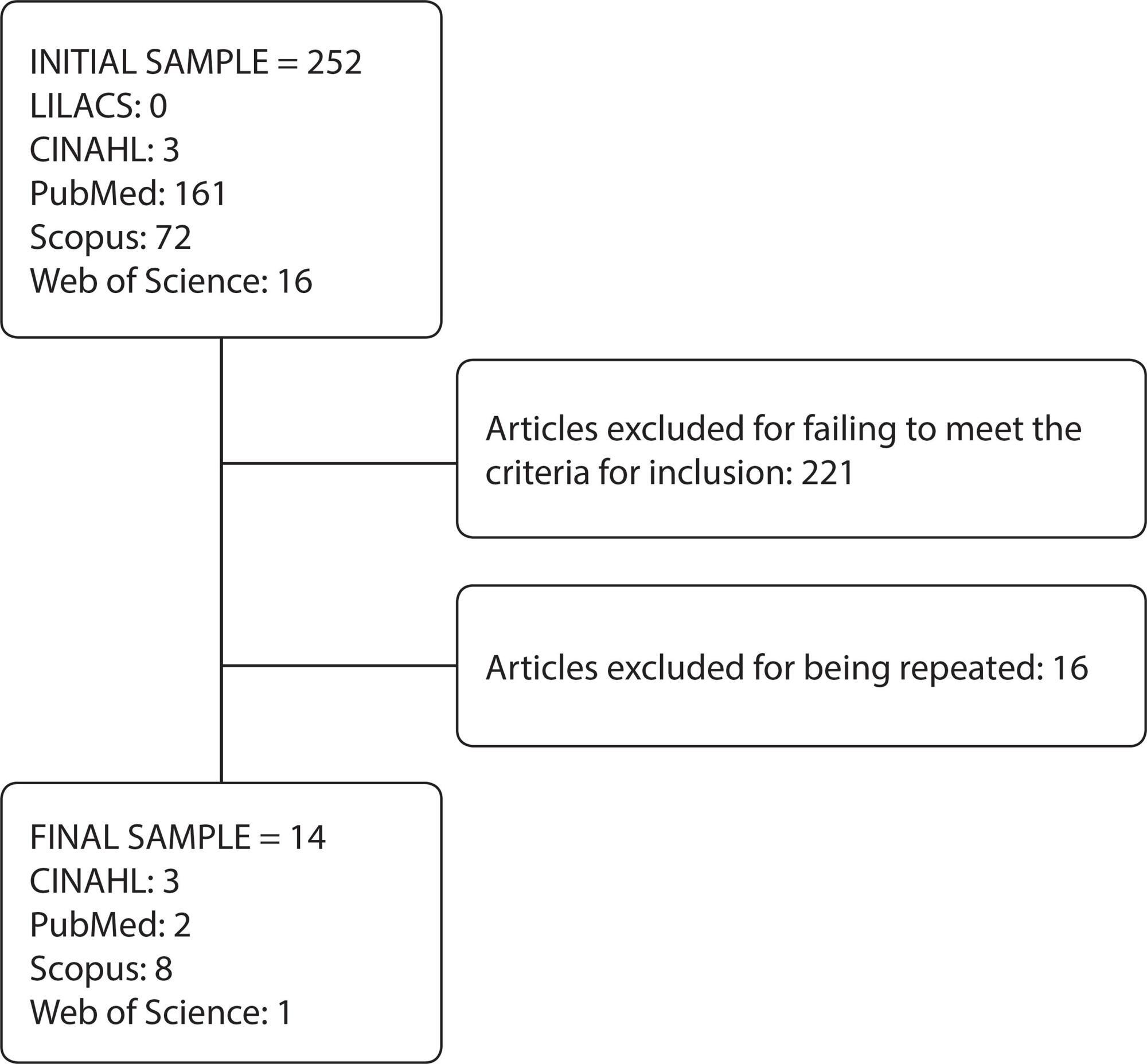-
RESEARCH01-01-2018
Educational technology for people living with HIV: validation study
Revista Brasileira de Enfermagem. 2018;71:1657-1662
Abstract
RESEARCHEducational technology for people living with HIV: validation study
Revista Brasileira de Enfermagem. 2018;71:1657-1662
DOI 10.1590/0034-7167-2017-0824
Views0See moreABSTRACT
Objective:
to validate an educational technology to support the action of health professionals with people living with HIV.
Method:
methodological study with data collection using a four-point Likert scale for evaluation by eleven judges and 51 people living with HIV. The data were tabulated, processed, and analyzed by inferential and descriptive statistics, Cronbach’s alpha test, and Kruskal-Wallis for reliability and internal consistency analyses.
Result:
the Cronbach’s alpha was 0.974 for judges and 0.694 for the target audience, reliable values. Kruskal-Wallis tested hypotheses H0 and H1 with significance of 0.05. H0 was accepted with significance of 0.395 for judges and 0.187 for the target audience, demonstrating agreement on the distribution of answers. Judgements with favorable response of at least 70% were considered relevant, according to the performed tests.
Conclusion:
the technology presents high reliability and good internal consistency, being deemed appropriate.
-
RESEARCH01-01-2018
Teaching strategies: promoting the development of moral competence in undergraduate students
Revista Brasileira de Enfermagem. 2018;71:1650-1656
Abstract
RESEARCHTeaching strategies: promoting the development of moral competence in undergraduate students
Revista Brasileira de Enfermagem. 2018;71:1650-1656
DOI 10.1590/0034-7167-2017-0704
Views0See moreABSTRACT
Objective:
To identify strategies and spaces used by professors to promote the development of the moral competence of nursing undergraduate students.
Method:
Qualitative research, developed with 20 nursing professors, through a semi-structured interview, from July to October 2016. Data were submitted to discursive textual analysis.
Results:
Three categories were constructed: Active methodologies as strategies for the development of moral competence; Knowledge and development of clinical reasoning as motivating spaces of moral competence; Attitude of professors as a strategy for dialogue, empathy, recovery of moral values and development of caring skills.
Final considerations:
The use of strategies and spaces to develop pedagogical actions favors the search for knowledge, clinical reasoning and the approach of ethical and moral aspects that collaborate for the development of the moral competence of nursing undergraduate students.
-
RESEARCH01-01-2018
Quality of life and eating attitudes of health care students
Revista Brasileira de Enfermagem. 2018;71:1642-1649
Abstract
RESEARCHQuality of life and eating attitudes of health care students
Revista Brasileira de Enfermagem. 2018;71:1642-1649
DOI 10.1590/0034-7167-2017-0224
Views0See moreABSTRACT
Objective:
To assess the quality of life and eating attitudes of health care students of the undergraduate programs of a public university.
Method:
Observational, cross-sectional, and quantitative study performed in a federal university. Three questionnaires were used for data collection: a socio-demographic and academic, the WHOQOL-BREF and the Eating Attitudes Test (EAT-26).
Result:
399 students participated in this study, most women, average age of 22 years, average scores of EAT-26 of 15.12 and quality-of-life averages above 60 points in all domains. The students of the undergraduate program in Nutrition presented more inappropriate eating attitudes than other health care students; as the age evolves, vulnerability to inadequate eating attitudes increases; and the family income influenced negatively the quality of life in Physical and Social domains.
Conclusions:
Inadequate eating attitude diminishes the quality of life of health care students in all domains of the WHOOQOL-BREF.
-
RESEARCH01-01-2018
Construction and validation of an Educational Content Validation Instrument in Health
Revista Brasileira de Enfermagem. 2018;71:1635-1641
Abstract
RESEARCHConstruction and validation of an Educational Content Validation Instrument in Health
Revista Brasileira de Enfermagem. 2018;71:1635-1641
DOI 10.1590/0034-7167-2017-0648
Views0See moreABSTRACT
Objective:
to construct and validate the Educational Content Validation Instrument in Health.
Method:
methodological study that includes the establishment of the conceptual structure; definition of objectives and population; construction of items and response scale; selection and arrangement of items; instrument structuring; opinion of experts; pre-test and content validation.
Results:
an instrument with 15 items was constructed and, after expert evaluation, eighteen items were obtained, divided into three domains: objectives (four), structure/presentation (nine), and relevance (two). Six items were modified since they presented a percentage of agreement below 0.8. Items of the total instrument presented good internal consistency (0.877) regarding domains.
Conclusion:
an Educational Content Validation Instrument in Health was elaborated and validated, presenting good reliability, and may contribute to the practice of researchers and health professionals in the development of educational content.
-
RESEARCH01-01-2018
Teaching of infection control in undergraduate courses in health sciences: opinion of experts
Revista Brasileira de Enfermagem. 2018;71:1626-1634
Abstract
RESEARCHTeaching of infection control in undergraduate courses in health sciences: opinion of experts
Revista Brasileira de Enfermagem. 2018;71:1626-1634
DOI 10.1590/0034-7167-2017-0928
Views0See moreABSTRACT
Objective:
To know the perception of expert professionals in infection control and prevention on the teaching of skills for the prevention and control of infections related to health care in undergraduate courses in Health Sciences.
Method:
We used the Delphi technique, developed in four sequential rounds. Thirty-one nurses and eight physicians participated in the study. Qualitative data were analyzed through content analysis; the quantitative ones, from the descriptive statistics.
Results:
The importance of the courses has had teachers with expertise in infection control and prevention added to arguments about the development of the subject in the curricula by means of a specific subject or as a transversal theme.
Conclusions:
In order to cover the complexity of the elements that are interconnected for professional training, teaching must be based on pedagogical strategies that provoke reflection in students, encouraging them to develop critical thinking about their experiences.
-
RESEARCH01-01-2018
Nursing international student mobility in the University of São Paulo
Revista Brasileira de Enfermagem. 2018;71:1619-1625
Abstract
RESEARCHNursing international student mobility in the University of São Paulo
Revista Brasileira de Enfermagem. 2018;71:1619-1625
DOI 10.1590/0034-7167-2017-0754
Views1See moreABSTRACT
Objective:
To characterize the experiences of undergraduate students of the School of Nursing of the University of São Paulo (EEUSP) who participated in international mobility programs between January 2011 and July 2017.
Method:
Exploratory, descriptive study with quantitative approach. Of 68 reports, only 38 (56%) were considered valid and were submitted to descriptive statistical analysis. Data were categorized in general, institutional, academic and cultural aspects and cost of living.
Results:
The main destination was Portugal and the years with most participation were 2012 and 2013. The mean stay was six months and the students took a mean of three to four courses. The main funder was the university of origin.
Conclusion:
Academic activities were limited to theoretical and practical courses, with little insertion in research. There is a need to increase investment in learning other languages and to expand partnerships with larger centers of foreign education and research.
-
RESEARCH01-01-2018
Training in diabetes education: meanings attributed by primary care nurses
Revista Brasileira de Enfermagem. 2018;71:1611-1618
Abstract
RESEARCHTraining in diabetes education: meanings attributed by primary care nurses
Revista Brasileira de Enfermagem. 2018;71:1611-1618
DOI 10.1590/0034-7167-2017-0792
Views1See moreABSTRACT
Objective:
seize meanings attributed by primary care nurses to training in diabetes education.
Method:
exploratory and descriptive study, with a qualitative approach, with twenty primary care nurses; semistructured interview script, with interviews processed in the IRaMuTeQ software and analyzed through the Descending Hierarchical Classification. The results were subsidized in the Representational Theory of Meaning.
Results:
nurse training in diabetes education is insufficient for holistic action, although it allows the community to be instrumentalized in specific issues about the disease, using the limited tools available, especially lectures. Nurses find themselves in a context of challenges, improvisations, weaknesses, and limitations that determine the meaning attributed to diabetes education and subsequent actions.
Conclusion:
the meanings attributed by the nurses revealed an incipient training, which limits the quality of care provided and instigates the search for qualification.

-
RESEARCH01-01-2018
Educational animation about home care with premature newborn infants
Revista Brasileira de Enfermagem. 2018;71:1604-1610
Abstract
RESEARCHEducational animation about home care with premature newborn infants
Revista Brasileira de Enfermagem. 2018;71:1604-1610
DOI 10.1590/0034-7167-2017-0401
Views0See moreABSTRACT
Objective:
to elaborate and validate animation on the care of premature newborn infants at home.
Method:
Methodological study in three stages: integrative review on home care; animation design based on Roper, Logan and Tierney’s Model named “Activities of Living” (ALs), and validation of content and appearance by neonatology specialists. The steps to develop the animation were: creation of storyboard; definition of objects; specification of keyframes; and frame generation among key frameworks.
Results:
Of the 53 articles selected in the review, care was extracted and grouped into the twelve activities of living. Three storyboards were created to embrace all care and validated by 22 experts. Most of the care had matches above 80%.
Conclusion:
The validation of the storyboards made it possible to glimpse the changes in scenes and dialogues in a clearer and more detailed way. Animation is an innovative educational technology to support teaching and learning of parents and family.

-
ORIGINAL ARTICLE03-24-2021
Development, validation and application of clinical simulation scenarios for assessment of stomatherapy specialists
Revista Brasileira de Enfermagem. 2021;74(1):e20200360
Abstract
ORIGINAL ARTICLEDevelopment, validation and application of clinical simulation scenarios for assessment of stomatherapy specialists
Revista Brasileira de Enfermagem. 2021;74(1):e20200360
DOI 10.1590/0034-7167-2020-0360
Views0See moreABSTRACT
Objectives:
to build and validate three clinical simulation scenarios and report the application with candidates for the specialist’s degree in stomatherapy.
Methods:
methodological study, building three scenarios and evaluation checklists; content validation with judges, using content validity index and Modified Kappa Coefficient; pre-test and application.
Results:
scenarios built based on nursing care for: 1. insufficiency and venous ulcer; 2. demarcation of intestinal stomia; and 3. Clean intermittent catheterization. In the content validation of the 24 items appreciated, 83%, 80%, and 92% were validated without change. In the pre-test, the objectives and checklists were adjusted. In the application, to standardize the evaluation, actors and evaluators were trained previously, and each candidate passed the three stations.
Conclusions:
scenarios built and with validated content, based on evidence and covering the three areas of stomatherapy. The pre-test allowed for adjustments in the scenarios, and the candidates achieved the expected objectives.
-
REVIEW07-10-2020
Acute Kidney Injury by SARS-CoV-2 virus in patients with COVID-19: an integrative review
Revista Brasileira de Enfermagem. 2020;73:e20200354
Abstract
REVIEWAcute Kidney Injury by SARS-CoV-2 virus in patients with COVID-19: an integrative review
Revista Brasileira de Enfermagem. 2020;73:e20200354
DOI 10.1590/0034-7167-2020-0354
Views0See moreABSTRACT
Objective:
to assess scientific evidence on SARS-CoV-2 Acute Kidney Injury in patients with COVID-19.
Methods:
an integrative review, with adoption of PICO strategy and classification of the level of evidence, carried out on April 10, 2020 in the PubMed database, of articles available between December 2019 and April 2020.
Results:
the sample consisted of six original, five observational and one experimental articles. Observational studies addressed the clinical findings of patients with COVID-19 and association between kidney damage, infection, and morbidity-mortality.
Conclusion:
the studies addressed the mechanism of intracellular infection of SARS-CoV-2, its cytopathic effects on kidney cells and incidence of acute kidney injury in patients infected with SARS-CoV-2. Acute kidney injury is associated with increased mortality and morbidity in these patients. This review realizes the need for new research that can mention kidney care to patients with COVID-19.

-
ORIGINAL ARTICLE12-05-2019
Factors associated with metabolic syndrome in older adults: a population-based study
Revista Brasileira de Enfermagem. 2019;72:221-228
Abstract
ORIGINAL ARTICLEFactors associated with metabolic syndrome in older adults: a population-based study
Revista Brasileira de Enfermagem. 2019;72:221-228
DOI 10.1590/0034-7167-2018-0620
Views0See moreABSTRACT
Objective:
To estimate the prevalence of the metabolic syndrome and clusters of its components and to identify possible associated factors in older adults.
Method:
Cross-sectional and population-based study, involving 271 older people. We collected sociodemographic, behavioral, clinical, biochemical, and anthropometric data. Data were analyzed by descriptive and logistic regression techniques.
Results:
The prevalence of metabolic syndrome was 59% and was associated with women, overweight/obesity, and the C-reactive protein. Concerning the clusters, 11.4% of the sample had all the components of the metabolic syndrome, and only 5.2% of individuals did not have any of its components.
Conclusion:
We found there is a high prevalence of metabolic syndrome and clusters of its components in older adults. It is important to deepen studies on this matter, considering clinical aspects in relation to sex and healthy behavioral habits for creating public policies as well as emphasizing actions aimed at promoting self-care in all cycles of life.

-
08-19-2019
Institutional strategies to prevent violence in nursing work: an integrative review
Revista Brasileira de Enfermagem. 2019;72(4):1052-1060
Abstract
Institutional strategies to prevent violence in nursing work: an integrative review
Revista Brasileira de Enfermagem. 2019;72(4):1052-1060
DOI 10.1590/0034-7167-2018-0687
Views0See moreABSTRACT
Objective:
To analyze the production of research that adopted as object of investigation: institutional strategies, actions and programs to curb and/or prevent the nursing workplace violence.
Method:
Integrative review of 14 articles in full, available in the databases LILACS, PubMed Central, Scopus, CINAHL and Web of Science.
Results:
Of the articles analyzed, most arise from quantitative research (71%), carried out in the United States (65%), with educational actions (57%) and programs (43%), denoting policies.
Conclusion:
Results showed various ways to curb or prevent nursing workplace violence. These are specific strategies, there are few programs deployed worldwide, usually centered in the United States, Canada and Sweden. Most of them is well evaluated and can serve as a model for the development and dissemination of policies according to the needs of each location.

-
08-19-2019
Professional education on dementias in Primary Health Care: an integrative review
Revista Brasileira de Enfermagem. 2019;72(4):1086-1093
Abstract
Professional education on dementias in Primary Health Care: an integrative review
Revista Brasileira de Enfermagem. 2019;72(4):1086-1093
DOI 10.1590/0034-7167-2018-0652
Views0See moreABSTRACT
Objective:
To investigate the most commonly used educational approaches in dementia training for primary health care professionals.
Method:
Integrative literature review, conducted between April and June of 2018, in PubMed, LILACS and IBECS databases. The descriptors used were: Training, Health Personnel, Dementia, Primary Health Care for PubMed; and the MeSH terms, Training Programs, Health Personnel, Dementia, and Primary Health Care for LILACS and IBECS.
Results:
The sample consisted of 13 articles; eight were published in the last five years (62%); seven articles with a quantitative approach (54%); seven articles produced on the European continent (54%), followed by five published on the North American continent (38%). All journals were from the health area (100%).
Conclusion:
Educational strategies were combined and used for education. Significant improvements in knowledge, skills, and attitudes of the teams with regard to professional management of dementias were evidenced.

-
05-21-2021
Quality of life and falls in elderly people: a mixed methods study
Revista Brasileira de Enfermagem. 2021;74:e20200400
Abstract
Quality of life and falls in elderly people: a mixed methods study
Revista Brasileira de Enfermagem. 2021;74:e20200400
DOI 10.1590/0034-7167-2020-0400
Views0See moreABSTRACT
Objective:
to assess elderly people’s quality of life, understanding the social representations of falls.
Methods:
a convergent mixed methods research carried out at homes, with a sample of 134 elderly people. A structured questionnaire was used, covering sociodemographic variables and factors that indicated frailty and risk of falling. For quality of life assessment, Medical Outcomes Study Short-Form 36 and Theory of Social Representations, Abric’s structural approach were used, with data treated by dictionary of equivalent terms, processed in Evoc 2000, converging analytically according to Neuman.
Results:
quality of life impairment was identified in terms of physical, emotional and functional capacity. The elements of the possible central nucleus were fall, fear, and bruised-broken-bone.
Final considerations:
quality of life impairment can contribute to increase the number of falls, which has been shown to be an event present in elderly people’s lives through evocations. Understanding elderly people’s individual demands allows planning actions.

-
ORIGINAL ARTICLE02-10-2020
Common mental disorders in nursing students of the professionalizing cycle
Revista Brasileira de Enfermagem. 2020;73(1):e20180154
Abstract
ORIGINAL ARTICLECommon mental disorders in nursing students of the professionalizing cycle
Revista Brasileira de Enfermagem. 2020;73(1):e20180154
DOI 10.1590/0034-7167-2018-0154
Views0See moreABSTRACT
Objectives:
to verify the suspicion of common mental disorders in nursing students of the professionalizing cycle and the association with sociodemographic features.
Method:
cross-sectional study with a sample of 85 students from a public university in the state of Rio de Janeiro (RJ) who responded to the Self-Report Questionnaire-20 and sociodemographic questions.
Results:
the suspicion prevalence of common mental disorders (CMD) in the sample was 55.3% and it was identified the association with the consumption of alcohol. Of the most frequent SRQ-20 complaints, 95.3% reported “feeling nervous, tense or worried”, 72.9% “having difficulty making decisions”, 60% “sleeping poorly” and 37.6% “having lost interest by things “.
Conclusion:
high prevalence of CMD in the sample and the association with the consumption of alcohol requires preventive and therapeutic actions among the students that minimize the possibility of severe mental disorders related to the consumption of alcohol and other drugs.
-
REVIEW07-13-2020
Prevention and control measures for neonatal COVID-19 infection: a scoping review
Revista Brasileira de Enfermagem. 2020;73:e20200467
Abstract
REVIEWPrevention and control measures for neonatal COVID-19 infection: a scoping review
Revista Brasileira de Enfermagem. 2020;73:e20200467
DOI 10.1590/0034-7167-2020-0467
Views0See moreABSTRACT
Objective:
to identify with the literature the measures to prevent and control neonatal infection by COVID-19.
Methods:
a scope review carried out by searching for studies in databases and institutional health websites. The final sample was 25 articles.
Results:
among the main measures are the use of masks by suspected or infected people in contact with healthy newborns, hand hygiene before and after each care and feeding as well as the tools used for milking. It is indispensable to use personal protective equipment by health professionals in neonatology services to maintain a private room for infected newborns or to use physical barriers. Early diagnosis and timely case management is essential to reduce virus transmissibility.
Conclusions:
the research contributed to elucidate health and nursing actions in preventing and controlling neonatal infection by COVID-19.

Search
Search in:
Nuvem de Tags
Adolescente (85) Atenção Primária à Saúde (239) COVID-19 (91) Criança (91) Cuidados de Enfermagem (269) Educação em Enfermagem (151) Educação em Saúde (139) Enfermagem (930) Enfermagem Pediátrica (86) Estudantes de Enfermagem (77) Estudos de Validação (131) Família (87) Idoso (208) Promoção da Saúde (99) Qualidade de Vida (104) Saúde do Trabalhador (86) Saúde Mental (145) Saúde Pública (82) Segurança do Paciente (150) Tecnologia Educacional (100)



